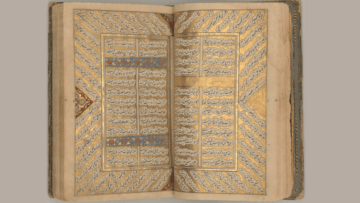Nilo Tabrizy in Guernica:
 For the past year, I’ve been researching and studying the works of Hafez, one of Iran’s most beloved and influential poets. More than 600 years after his death, his work is still invoked regularly, quoted by Iranian politicians to skewer their rivals and by everyday Iranians in casual conversations over dinner. Normally, this is the part where I would share a verse of his work, or tell you how complex and beautiful his words are. I would to tell you how Iranians use his poems as a form of divination, like a tarot card reading of sorts. Instead, I am consumed with trying to understand why I’ve been devoting so much time to studying the verses of a poet from the fourteenth century right now, when my country is going through every imaginable version of pain. Wouldn’t it make more sense to focus on current national security issues instead of diving into the art of our past?
For the past year, I’ve been researching and studying the works of Hafez, one of Iran’s most beloved and influential poets. More than 600 years after his death, his work is still invoked regularly, quoted by Iranian politicians to skewer their rivals and by everyday Iranians in casual conversations over dinner. Normally, this is the part where I would share a verse of his work, or tell you how complex and beautiful his words are. I would to tell you how Iranians use his poems as a form of divination, like a tarot card reading of sorts. Instead, I am consumed with trying to understand why I’ve been devoting so much time to studying the verses of a poet from the fourteenth century right now, when my country is going through every imaginable version of pain. Wouldn’t it make more sense to focus on current national security issues instead of diving into the art of our past?
Recently I interviewed Afshon Ostovar, a renowned Iran expert who focuses on the IRGC. I was talking to him about the Qods Force, the unit that was commanded by Qassim Soleimani, the general killed by the United States in a drone strike in January. He told me he had noticed some recent tweets of mine about Persian poetry, and said he found it sweet to read something like that while both of our professional fields were dealing with an onslaught of depressing news.
After our interview, I kept thinking about what Ostovar said. Why am I always drawn to poetry, even in times when more pressing headlines should capture my attention?
Certainly, poetry is central to Iranian identity. The Shahnameh, an epic poem by Persian poet Ferdowsi, cemented this connection. Ferdowsi began writing this narrative of more than 50,000 couplets in 977 AD and completed the endeavor forty-three years later in 1010. The poem tells the mythical tale of the history of ancient Iran, a story stretching back from the creation of the world to the seventh century, when the Arabs conquered Iran. When Ferdowsi was writing, the Arab invasion imposed a new language and religion on the people of Iran. With Shahnameh, Ferdowsi preserved our language and history at a time when it was in danger of being lost forever.
More here.
